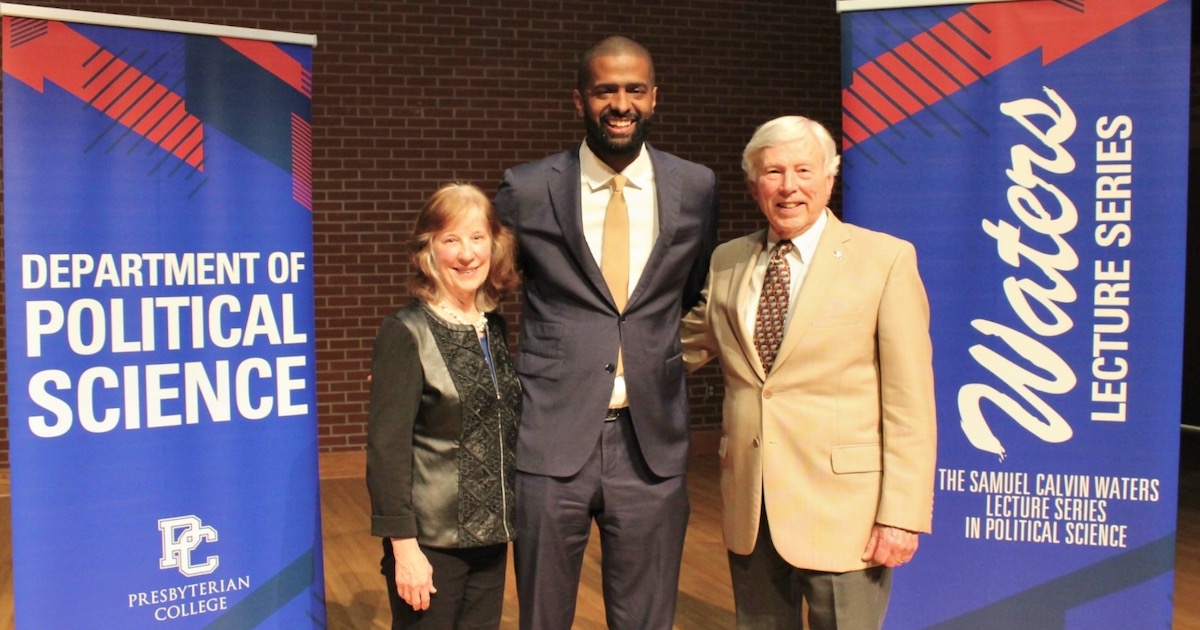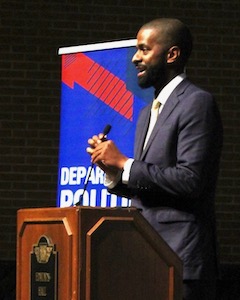Bakari Sellers explores country’s past and potential future during Sam Waters Lecture at Presbyterian College

Guest lecturer Bakari Sellers with Presbyterian College alumnus, Samuel C. Waters ’66 and his wife, Mary.
CNN analyst and former South Carolina lawmaker Bakari Sellers asked two critical questions during his speech Wednesday at Presbyterian College.
In a discussion steeped in Black history, Sellers said the country is past due for a conversation on race that begs the questions – how far have we come, and where do we go from here?
“I think about these two very simple questions of how far have we come and where do we go from here and I remember that we’re on this journey, and it’s not a singular step, but a collection thereof,” he said.
To answer the first question, Sellers drew deeply from South Carolina’s history of race relations and the many people who struggled and fought – even died – to create a more equitable society for all people.

Bakari Sellers, the 2024 guest speaker for the Samuel C. Waters Lecture Series in Political Science
“A lot of times we forget the fact that we stand on the shoulders of so many great heroes and heroines who we don’t have to necessarily read about, but who actually smelled those gunshots and laid on those jailhouse floors,” Sellers said.
George Elmore, for example, was a young black entrepreneur who not only was turned away from voting in an all-white primary election but was attacked for filing a lawsuit – Elmore v. Wright – against the South Carolina Secretary of State to have access to the ballot.
Sellers said Elmore and his wife died broken and penniless – losing everything but laying the foundation for African Americans to secure the legal right to vote in primary elections.
In 1954, Sarah Mae Flemming became the public face of the fight to desegregate public transportation in South Carolina when she was attacked by a white driver for exiting a bus through a “whites only” door.
“Her story is so unique because she wasn’t looking to make history that day,” Sellers said. “She was 22 years old. She wasn’t looking to make history. She literally just sat down because she was tired. And when the bus driver told her to get up and get out, she went out the door that she thought was closest. But Sarah joined with some young enterprising lawyers from the NAACP Legal Defense Fund and laid the foundation in action and in law for another young lady who sat down 18 months later named Rosa Parks.”
Sellers also shared the story of Harry and Eliza Briggs from Clarendon County, S.C., who sued their local school superintendent so that their children could have the same access to public transportation as white children. Their suit, Briggs v. Elliott, was also foundational, he said, as it eventually led to the landmark Brown v. Board of Education case and the U.S. Supreme Court ruling that ended school segregation.
“How far have we come?” Sellers asked. “Whether or not you’re black or white, whether you’re from the Upstate or the Lowcountry, if you have a certain level of intellectual honesty, we all come to the same conclusion.
“When I think about the fact that today we still live in a generation where there are people who don’t understand the price that was paid for access to the ballot box or public transportation. There are people who work extremely hard to take that right away from you and ask yourself that very simple question: how far have we come? I’ve resolved that the answer to the question, how far have we come, is that we’ve made great progress, but we still have a ways to go. And there are so many people who want to put a period after the progress we’ve made but don’t want to acknowledge the ways we still have yet to go.”
Sellers said the more complex question, by far, to answer is, where do we go from here?
“This is the most difficult conversation that I have to have because I do not know the answer to the question of where we have to go,” he said.
Sellers told the story of a young man born in his hometown of Denmark, S.C., who was only 10 years old in 1955 when he learned about Mamie Till’s courageous decision to hold an open-casket funeral for her dead son, Emmitt, who was brutally beaten to death in Philadelphia, Miss., for allegedly whistling at a white woman. Till’s decision, which revealed the violent racism of the segregated South to the world, inspired that 10-year-old to join the Civil Rights Movement.
That young man was Sellers’ father, legendary Civil Rights activist Cleveland Sellers, who got involved with the Student Non-violent Coordinating Committee as a college student and took part in the effort to register black voters in Mississippi and later was shot by South Carolina State Troopers during the Orangeburg Massacre that killed three of his fellow students and wounded 26 others.
Despite being shot, Cleveland Sellers was arrested and charged, tried, and convicted for rioting, while the troopers who shot him and killed his schoolmates were acquitted.
“The reason I share that story with you guys is because on that night, an injustice left mothers without their sons and the pages of our state’s history stained red with blood,” Sellers said.
In the stories of the Civil Rights heroes and heroines, Sellers said, is the answer to the question, “Where do we go from here?”
“The first thing we have to do is rededicate ourselves to the proposition of dreaming with our eyes open,” he said. “There are a lot of individuals in this room, whether or not you’re seven or 77, who have to rededicate yourselves to understanding that there’s nothing that you cannot accomplish — ordering your steps and dreaming with your eyes open. The second thing you have to do is even more difficult than that.
“My grandmother used to tell me, you can’t fall off the floor. There are a lot of us in this room who feel like we’ve been put on the floor. A lot of immigrants. Black and gay folks. Women. Muslim. People who just feel like they’ve been cast aside. Who are just on the floor. The challenge for us is to do something which is damn hard. We have to learn how to love our neighbors. We have to learn how to dream with our eyes open and love our neighbors even when they don’t love us. Maybe then we can get to a goal at the end of this journey.”
PC alumnus Samuel C. Waters ’66 established the Samuel Calvin Waters Lecture Series in Political Science to bring notable political scholars to campus who can highlight the value and relevance of the study of politics and contemporary issues. This year’s event is co-sponsored by the Waters Lecture Series and the college’s Russell Program.
